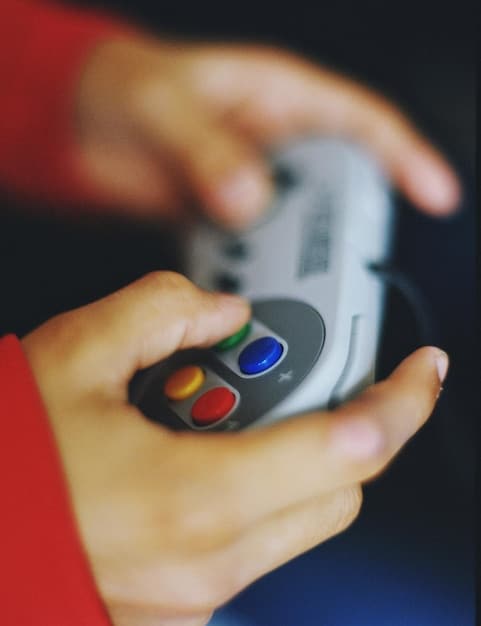The Future of Console Gaming: Will Physical Games Survive the Digital Download Revolution?

By 2026, digital downloads are predicted to significantly impact console gaming, potentially overshadowing physical games due to increased convenience, accessibility, and evolving consumer preferences, posing a challenge to the traditional prevalence of physical media in the gaming industry.
The gaming world is in constant flux, and one of the biggest questions swirling around is: **The Future of Physical Games: Will Digital Downloads Dominate Console Gaming by 2026?** The shift towards digital consumption is undeniable, but does that mean physical games are destined for extinction? Let’s delve into the forces at play and try to predict what the future holds.
The Rise of Digital Downloads: A Paradigm Shift
The gaming landscape has drastically changed over the past decade. Digital downloads have emerged as a dominant force, altering how we purchase, access, and experience video games. This shift presents both opportunities and challenges for the traditional physical game market.
But what’s driving this change, and how far-reaching will its impact be on console gaming?
Convenience and Accessibility
One of the key drivers behind the popularity of digital downloads is the sheer convenience they offer. No more trips to the store or waiting for deliveries. Gamers can purchase and download games from the comfort of their own homes, often with just a few clicks.
This instant gratification is particularly appealing in our fast-paced, on-demand society.
Price and Availability
Digital distribution also opens doors to broader accessibility. Digital storefronts can offer games at potentially lower prices due to reduced manufacturing and distribution costs. Additionally, digital platforms can host a diverse array of titles, including indie games and classic retro titles that may not be viable for physical releases.
- Instant access to new releases and pre-orders.
- No need to store or manage physical game collections.
- Potential for exclusive digital-only content and bundles.
- Easy access to a vast library of games, including older titles.
Ultimately, the rise of digital downloads signifies a significant shift in consumer behavior, driven by convenience, cost savings, and a broader range of gaming options. This trend poses a serious challenge to the traditional dominance of physical games in the console gaming market.

The Enduring Appeal of Physical Games
Despite the rise of digital downloads, physical games still hold a special place in the hearts of many gamers. Several factors contribute to the enduring appeal of owning physical copies of games, and these reasons might be key to the survival of physical games.
What are these reasons, and how do they stack up against the digital tide?
Collectibility and Ownership
For many, owning a physical game is about more than just playing it. It’s about collecting, displaying, and having a tangible connection to the games they love. Physical games provide a sense of ownership that digital downloads simply can’t replicate.
This collectibility aspect fuels a thriving secondary market for rare and vintage games.
Resale Value and Sharing
Another advantage of physical games is their resale value. Gamers can trade in or sell their physical copies after they’ve finished playing, recouping some of their initial investment. Physical games can also be easily shared with friends and family, allowing for a more social and communal gaming experience.
The Nostalgic Factor
Many gamers grew up collecting physical games, and the tactile experience of opening a new game case, reading the manual, and inserting the disc or cartridge is steeped in nostalgia. This nostalgic appeal holds a strong pull for many, counteracting the convenience of digital downloads.
- Physical games provide a sense of ownership and permanence.
- They can be traded, sold, or gifted, offering financial and social benefits.
- Collecting physical games is a popular hobby for many gamers.
- Physical games evoke nostalgic memories and a connection to gaming history.
Despite the convenience of digital downloads, physical games retain a strong appeal due to their collectibility, resale value, and the sense of nostalgia they evoke. These factors help explain why physical games haven’t disappeared altogether and might indicate their continued importance.
Console Manufacturers’ Strategies: Steering the Course
Console manufacturers like Sony (PlayStation), Microsoft (Xbox), and Nintendo play a crucial role in shaping the future of physical games. Their strategies regarding hardware, software distribution, and subscription services significantly impact the balance between physical and digital games.
What are the strategies, and how effective will they be in preserving or phasing out physical games?
Hardware Design and Digital Integration
Console manufacturers are experimenting with different hardware designs. While current-generation consoles still include disc drives, there’s been a push towards digital-only consoles, signaling a potential shift in focus. How deeply these consoles integrate with digital storefronts and subscription services is another key factor.
The design choices directly impact user access to physical media.
Subscription Services and Game Streaming
Subscription services like Xbox Game Pass and PlayStation Plus offer gamers access to a vast library of games for a monthly fee. This model encourages digital game consumption and could potentially reduce the demand for individual physical game purchases. Furthermore, game streaming services are emerging, potentially making physical ownership even less relevant.
These services change the paradigm from owning games to accessing them.
Balancing Physical and Digital Offerings
Console manufacturers face the challenge of balancing their support for physical and digital games. They need to cater to both segments of the gaming market while simultaneously adapting to the evolving landscape. The strategies they choose will heavily impact the future trajectory of physical games.
- Digital-only consoles signal a potential shift away from physical media.
- Subscription services promote digital game consumption over ownership.
- Manufacturers must find ways to balance support for both physical and digital formats.
- Game streaming services may further diminish the importance of physical game ownership.
Console manufacturers’ strategies are pivotal in determining the future of physical games. Decisions on hardware design, subscription services, and support for both physical and digital formats will ultimately shape how gamers consume and access video games in the years to come.

Independent Developers and the Physical Media Renaissance
While major publishers increasingly focus on digital distribution, independent developers are experiencing a renaissance in physical media. Limited Run Games, Special Reserve Games, and other companies specialize in creating and distributing physical versions of indie games, catering to collectors and fans who appreciate tangible items.
How significant is the impact of indie developers?
Niche Appeal and Collector’s Editions
Independent developers capitalize on niche appeal, creating physical releases for games that might not otherwise see a physical edition. They often offer collector’s editions with unique packaging, artwork, and bonus items, further enhancing the value for collectors.
These limited-run physical releases become sought-after items.
Community and Fan Engagement
Indie developers often foster strong relationships with their fans, actively engaging with them on social media and at gaming conventions. This direct connection helps build excitement and demand for their physical releases, demonstrating the power of community in supporting tangible media.
They understand the value of catering to dedicated fans.
Preservation and Accessibility
Physical releases of indie games also contribute to the preservation of gaming history. By creating tangible copies, they ensure that these games are not lost to time due to server shutdowns or digital storefront closures, maintaining accessibility for future generations.
- Indie developers are fueling a physical media renaissance with limited-run releases.
- Collector’s editions and unique packaging enhance the value of physical copies.
- Strong community engagement helps drive demand for physical games.
- Physical releases contribute to the preservation of gaming history.
Independent developers are playing a crucial role in sustaining the physical game market by creating unique, collectible releases that appeal to dedicated fans. This independent movement highlights the enduring value of physical media within a niche segment of the gaming community.
The Impact of Internet Infrastructure and Data Caps
The widespread adoption of digital downloads is heavily dependent on robust internet infrastructure and affordable data plans. However, significant disparities in internet access and the prevalence of data caps in certain regions can hinder the full transition to digital gaming.
What challenges do they pose?
Uneven Internet Access
Millions of people around the world lack access to high-speed internet, particularly in rural areas and developing countries. For these individuals, downloading large game files can be slow, expensive, or simply impossible, making physical games a more viable and practical option.
Access is key to digital adoption.
Data Caps and Download Limits
Even in regions with relatively good internet access, data caps can be a significant obstacle to digital gaming. Downloading large game files can quickly consume monthly data allowances, leading to overage charges or throttling, making physical media an attractive alternative.
Data caps hinder the digital experience.
Digital Divide and Inclusivity
The digital divide underscores the importance of maintaining physical game options to ensure inclusivity. Limiting access to games based on internet connectivity creates inequality and marginalizes gamers who lack the necessary infrastructure or financial resources.
- Uneven internet access globally limits the reach of digital downloads.
- Data caps can restrict the ability to download and play digital games.
- The digital divide highlights the need for physical game options to ensure inclusivity.
- Poor infrastructure and high costs limit the reach of digital downloads.
Internet infrastructure limitations and data caps pose significant obstacles to the complete dominance of digital downloads in console gaming. These factors underscore the importance of maintaining physical game options to ensure accessibility and inclusivity for all gamers, regardless of their location or internet capabilities.
Predicting the Future: Will Digital Downloads Dominate by 2026?
Considering all the factors discussed, predicting whether digital downloads will completely dominate console gaming by 2026 is complex. The shift towards digital is undeniable, but the enduring appeal of physical games, coupled with infrastructure limitations and indie developers’ efforts, suggests a more nuanced outcome.
What can we anticipate?
Continued Growth of Digital Downloads
Digital downloads will continue to grow in popularity due to their convenience and accessibility. Console manufacturers will likely continue pushing digital-only options and expanding their subscription services, further accelerating the transition.
Digital is on an upward trajectory.
The Persistence of Physical Games
Physical games will persist but likely in a reduced capacity. They will continue to cater to collectors, gamers with limited internet access, and those who value ownership and resale value. Niche physical releases from indie developers may also help sustain the market.
Physical games will find a niche.
A Hybrid Future
The most likely scenario is a hybrid future where both digital and physical games coexist. Console manufacturers will offer a range of options to cater to different consumer preferences, and the balance between physical and digital sales will vary depending on game genre, region, and platform.
- Digital downloads will continue to grow, driven by convenience and subscription services.
- Physical games will persist, catering to collectors and those with limited internet access.
- A hybrid future is the most likely outcome, with both formats coexisting.
- The balance between physical and digital games will depend on various factors.
While digital downloads are expected to significantly impact console gaming by 2026, a complete takeover seems unlikely. The persistence of physical games, fueled by collectibility, accessibility constraints, and indie development, suggests a hybrid future where both formats continue to coexist, each serving different segments of the gaming market.
| Key Point | Brief Description |
|---|---|
| 🚀 Digital Growth | Digital downloads will continue to increase in popularity due to convenience. |
| 💾 Physical Games | Physical games will persist, appealing to collectors and those with limited internet. |
| 🌐 Hybrid Future | A balanced market with both digital and physical options is likely. |
| 🎮 Indie Support | Independent developers sustain physical media through limited releases. |
FAQ
▼
It’s unlikely. While digital downloads are growing, physical games still appeal to collectors, gamers with limited internet access, and those who value ownership. A hybrid market is more probable.
▼
Digital downloads offer convenience, instant access, and often lower prices due to reduced manufacturing and distribution costs. They also eliminate the need to store physical copies.
▼
Physical games offer a sense of ownership, collectibility, and resale value. They also evoke nostalgic memories for many gamers and provide a tangible connection to their hobby.
▼
Console manufacturers are experimenting with digital-only consoles and expanding subscription services, which promote digital game consumption. Their decisions on hardware and service offerings significantly impact the balance.
▼
Indie developers are experiencing a renaissance in physical media, offering limited-run releases and collector’s editions that appeal to dedicated fans, helping sustain the physical game market within niche segments.
Conclusion
In conclusion, the future of console gaming is likely to be a blend of both digital convenience and the enduring appeal of physical games. While digital downloads are poised to grow, physical media will continue to hold value for collectors, gamers with limited access, and those who cherish the tangible aspects of gaming.